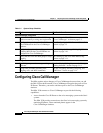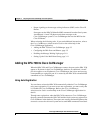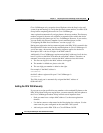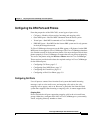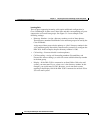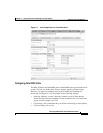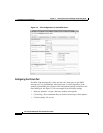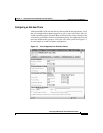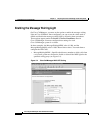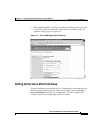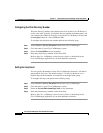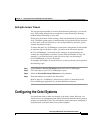
3-3
Cisco Digital PBX Adapter 7630 Administration Guide
78-11069-01
Chapter 3 Preparing the Cisco CallManager and Octel Systems
Configuring Cisco CallManager
• Proper signaling to the message waiting indicators (MWI) on the Cisco IP
Phones.
Some ports on the DPA 7630 handle MWI commands from the Octel system.
An additional “virtual” IP phone sends these messages to the
Cisco CallManager system. Cisco CallManager then sets the MWI on the
Cisco IP Phones.
When reviewing the following tasks, if you need additional instructions, refer to
the Cisco CallManager Administration Guide or the online help in the
Cisco CallManager application:
• Adding the DPA 7630 to Cisco CallManager, page 3-3
• Configuring the DPA Ports and Phones, page 3-5
• Enabling the Message Waiting Light, page 3-10
• Setting Up the Voice Mail Hunt Group, page 3-11
Adding the DPA 7630 to Cisco CallManager
When the DPA 7630 and Cisco CallManager connect, the ports on the DPA 7630
appear as IP phones in the Cisco CallManager database. An additional “virtual”
port also appears as an IP phone to Cisco CallManager, but it does not have any
correspondence to a physical port. It is created by the DPA 7630 to handle MWI
commands to Cisco CallManager.
Using Auto-Registration
You can choose to have the DPA 7630 automatically added to Cisco CallManager
using auto-registration. If you want to use auto-registration, you must verify that
it is enabled in Cisco CallManager. Refer to the Cisco CallManager
Administration Guide or online help in the Cisco CallManager application for
details.
Through auto-registration, when the DPA 7630 connects to Cisco CallManager,
the ports connected between the DPA 7630 and the Octel system are registered as
Cisco IP Phones in the database. These ports are actually emulated IP phones that
are used to access the voice mail system and to send MWI commands from Octel.




